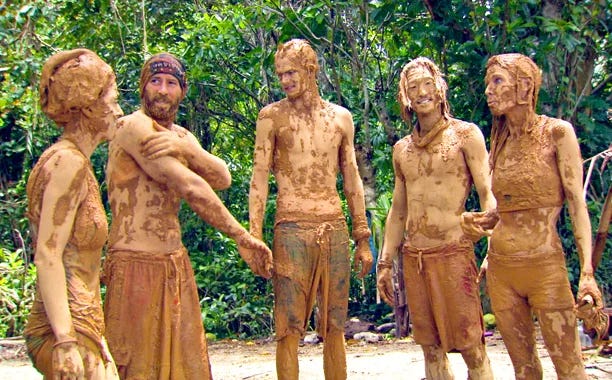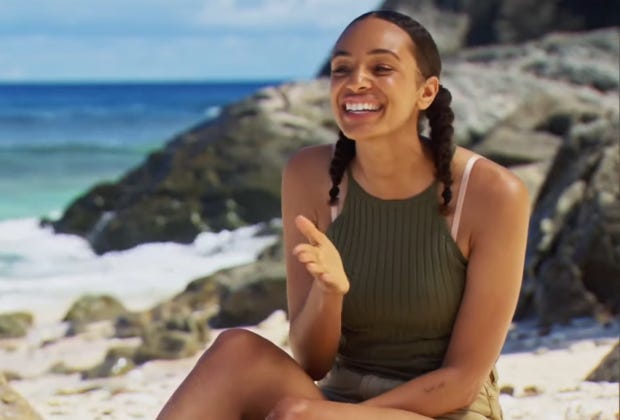On Survivor
"Come on in, guys!"
When I tweeted about my recent obsession with Survivor: Cagayan, I was amazed by how many people were also passionate about this season of reality TV from 2014. My favorite activity is taking low-brow entertainment and giving it a far more thoughtful, intellectual treatment than it demands, and Survivor is perfect for this. There also happens to be a new season after a long drought on filming during COVID. I have deemed it my responsibility to write about these two seasons today because I feel that, in your heart of hearts, you, too, want in on this content.
Survivor is a reality show with broad appeal that can also be construed as brilliant from the most generous of standpoints. Unlike the Real Housewives franchise, which I enjoy for its camp sensibilities but which I find too often buckles under the monotony of the cast-mates’ canned squabbles, Survivor inherently has all of the ingredients of good storytelling: tension, character, conflict, stakes. It’s a pretty simple concept for a reality show. Contestants have to source their own food, shelter, and fire while living in a remote location. They compete in challenges (standing on a skinny plank of wood suspended high above the water for as long as possible, big puzzles) for rewards and immunity. They are eliminated one-by-one at the “tribal council,” and the last survivor standing wins a million dollars. They are grappling with calorie deficits, extreme weather, and absolute filth, and they are battling it out with each other, physically and mentally. You have not seen crazy until you’ve seen someone roll around in mud and transfer that mud into a bucket for a chance to win an overcooked sirloin and a pineapple margarita from a pop-up Outback Steakhouse.
The show appeals to people’s basest needs and desires. The producers dangle something incredibly enticing in front of the contestants, pit them against each other, get them to a nearly unsustainable place of hunger and exhaustion, and watch what happens. I often tell my students, “put your characters through hell,” and I genuinely think any fiction writer could learn exactly why by watching a single episode of Survivor. These hungry, nasty people do incredibly irrational and entertaining things, given the money at stake and their diminished states, and, as the episodes go on, the strategizing and manipulation rise to a fever pitch, with rapidly shifting alliances and last-ditch efforts for immunity that resemble the frenzied rising action before a really great novel’s climax.
Cagayan is the third season I’ve watched in full, after the original season from 2000 (Borneo) and Heroes vs. Villains from 2010. (In addition to the new season, I also plan to eventually watch the All-Winners season, and maybe Cook Islands and Micronesia, all of which I’ve heard are pretty sick.) I was completely blown away by the strategic masterminds on Cagayan. I am constitutionally unable to lie, let alone manipulate people, and so watching contestants use scare tactics, alliances, deals, and calculated reveals to advance in this game is like watching another species operate. It takes a special kind of person to be good at Survivor: you’ve got to be dedicated, but not outwardly cutthroat; you need to be likeable, but not soft; you need to be a leader, but not too much of a leader; you need to be physically fit enough to be good at challenges but not so amazing at them that you’re a threat. Most of all, you have to have endurance. You have to not only last the longest, but you have to do it with aplomb, being more intellectually and physically resilient than everyone else.
As a kind of social experiment, the show is fascinating and often infuriating. I love that it casts contestants of a pretty diverse array of ages and races; the age differentials, especially, make for a unique melting pot among contemporary reality shows. At the same time, the casual racism, sexism, and ageism on Cagayan was outrageous. Two white women, Trish (a Pilates instructor from Boston) and Jefra (Miss Teen Kentucky), masterminded voting out the former NBA star Cliff Robinson because they found him “shady” and “lazy” (despite Cliff being not only their strongest physical player but also very obviously a mensch). (RIP to Robinson, who died last of lymphoma last year.) Spencer, a white college student and my greatest nemesis on this green earth, referred to his Black teammate J’Tia as an “engineer” in air quotes, despite the fact that at the time Spencer was an undergraduate and J’Tia was quite literally a nuclear engineer (J’Tia is now a Program Lead for the U.S. Department of Energy; Spencer goes by the name “Reiman.”) The delusional former NFL cheerleader, Morgan, who did nothing but nap on bamboo planks all day, believed that anyone who criticized her was simply jealous of her hotness, and was sure to call the formidable second-runner up, Kass, “bitter,” “ugly,” and “40” (lol) before getting the boot.
I find observing these micro- and macro-aggressions both depressing and telling. The producers of the show surely want animosity to develop between contestants, and deeply entrenched cultural identities pitted against one another is a tried-and-true way to achieve this. Simultaneously, though, it’s endearing to watch alliances form between similarly diverse groups of people; Woo, the sweetheart Korean-American surfer boy, and Cliff had a delightful buddy comedy going before Trish and Jefra conspired to vote Cliff out. Lindsey, a white dreadlocked single mom, recused herself from the show after Cliff’s elimination, because she was so tight with Cliff and so angry at Trish that she was worried she might “do something she regretted.” Even though Spencer is the worst, his closest ally was Tasha, who is the best — a Black accountant and superfan who won three individual immunity challenges in a row.
I kept saying that Tony, the winner of Cagayan, was the smartest dumb person I’d ever seen. I had my money on Kass or Tasha or Woo as the winner. Tony was the cop from Jersey City who was made to look like a bit of a fool. As the show went on, though, it became clear how brilliant Tony was at this game, and how much of my perception of him was due to bait-and-switch editing. Tony’s quests for hidden immunity idols (essentially, Party City necklaces with vaguely offensive talismans that grant the contestants safety from the next tribal council) were backgrounded with doofy music. His bon mots to the camera were punchlines, comic relief. I mean, he is a really funny character; he talks a little bit like a witless Sylvester Stallone, but his strategizing was out of this world. He told everyone at first that he was a construction worker, but slowly revealed to close allies that he was a cop, bringing people into his inner circle strategically, making them feel as if he trusted them. He told select people about his immunity idols, but then other times lied about their “powers,” which saved him from tribal council vote-outs more than once. He regularly swore on his wife, daughter, and his father’s grave when making promises to his teammates, then confiding to the camera, “that means nothing to me.” He was ruthless and people trusted him and he picked them all off one-by-one. Then, despite betraying pretty much all of them, he won against Woo in a 12-1 jury vote. (Only Tasha voted for Woo. Sweet Tasha and Woo, too good for this world.) That’s a great Survivor champion: someone who garners so much respect from the people he outplayed that they still can’t help but vote for him.
I’m kind of losing steam here, so just a short note on the current season, 41: It’s better than I was expecting! The postmodern aspect of it — that it’s framing itself as the “post-COVID” season, and the “new generation” of Survivor, plus showing camera crews? — is a little strange, and I miss the old school vibes, with less Probst and no behind the scenes scoops. Too much of the reminders that this is a filmed show takes me out of the immersiveness of being on the island. There’s way too much patting itself on the back for queerness and racial diversity. There was a whole pronoun thing that was disgusting — Jeff Probst asked the cast if he could still use the word “guys” in addressing the group for this signature “come on in, guys” at the start of every challenge. One queer woman said she was cool with it, so Probst deemed it okay. Then, later in the episode, one queer man said he wasn’t cool with it after all, and Probst said, “no more ‘guys’!” The virtue signaling was pathetic and made me disappointed in my boy JP.
There have been some big controversies of late, like Zeke Smith being outed as trans in a tribal council in Season 34, and the sexual misconduct that took place in Season 39. There was recently a roundtable featuring former Black Survivor contestants, the bottom line being that Survivor’s dearth of non-white producers has contributed to consistently harmful stereotyping of its BIPOC contestants. It’s helpful to remember that even though Survivor might be brilliant in theory, it is still, in the end, an exploitative reality show. It’s clear that the show is trying to do some image rehabbing on that front, but it feels about as gross as you might expect.
However, the fact that it’s a 26-day competition instead of the usual 39 (because of Fiji COVID regulations), there are faster eliminations, less immunity, no rice, etc., means the stakes are actually higher, and the game play is, in turn, legit. The second tribal council in the first episode was legitimately shocking, with Shan and Ricard somehow masterminding a bait-and-switch at the last second. I see those two as frontrunners. Shan is a pastor who is tricking everyone into thinking she’s saintly when in fact she is playing them all; Ricard is a flight attendant who seems to be really good at sniffing out shadiness. I also see big things for Evvie (a PhD student in evolutionary biology and very clearly a student of the show), and Danny (an incredibly likeable ex-NFL player who is probably just the right amount of smart and trustworthy). If I had to put my money on just one, though, I’m going with Shan.
Tell me your predictions for 41, your feelings on Cagayan, your favorite seasons. Should this just be a Survivor newsletter? What else do you want from this space? The stakes are really very low.
What I’m Reading
The Scapegoat by Sara Davis, a super strange literary mystery, very Patricia Highsmith with its arresting voice and unreliable narrator. I finished the Sally Rooney, loved it, and think most of the harsh critiques are a ‘lil bit petty. The lady is a great novelist, and I feel there’s a lot of grasping at straws from some folks out there re: her shortcomings. I’m too spent on Survivor critique to say more now, but my inbox is open. What did my fellow Rooney-tunes think of Beautiful World?
What I’m Listening To
This episode of the Daily, about the reopening of Broadway, made me cry. I’m nothing if not predictable.
Until next time,
m



